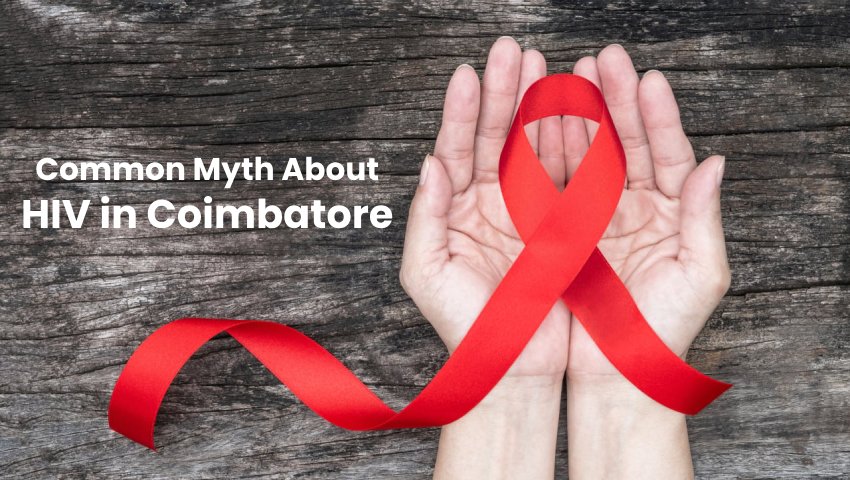
- 20/05/2025
- Dr. A Murali
- Blogs
Common Myth About HIV Specialist in Coimbatore
HIV is a virus that many people misunderstand, even today. These myths create fear & stigma around the infection & those who live with it. Dr.A.Murali, a trusted HIV specialist in Coimbatore, helps clear these myths & provides accurate information. Understanding the truth about HIV is important for better awareness and care.
What Is HIV?
HIV (Human Immunodeficiency Virus) attacks the immune system, making it harder for the body to fight infections. Without treatment, HIV can lead to AIDS (Acquired Immunodeficiency Syndrome), the most severe stage of infection. However, with modern antiretroviral therapy (ART), people living with HIV can lead long & healthy lives.
Myth About HIV Infection:
Myth 1: You can tell that someone is living with HIV by looking at them:
Many people think you can identify if someone has HIV just by their appearance. This is false. HIV does not show any visible signs, especially in the early or well-managed stages. People living with HIV who take proper treatment often look completely healthy & normal. Judging someone based on looks can lead to wrong assumptions & stigma. The only way to know someone’s HIV status is through testing.
Myth 2: HIV only affects certain sexual orientations:
HIV does not discriminate based on sexual orientation. Anyone can get HIV if they engage in behaviors that transmit the virus, such as unprotected sex or sharing needles. It affects heterosexuals, homosexuals, bisexuals, and people of all genders equally. Believing HIV affects only certain groups causes misunderstanding and stigma. Everyone should be aware and practice safe behaviors, regardless of their sexual orientation.
Myth 3: HIV affects childbirth and fertility:
It is a common myth that HIV affects a person’s ability to have children. With proper medical care, HIV-positive women can have safe pregnancies and deliver healthy babies without passing the virus to their child. Fertility is not affected by HIV itself. Antiretroviral treatment during pregnancy significantly reduces the risk of mother-to-child transmission, making childbirth safe for both mother and baby.
Myth 4: If you’re on PrEP, you don’t need to use condoms:
PrEP (Pre-Exposure Prophylaxis) is a daily medicine that helps prevent HIV infection. However, PrEP does not protect against other sexually transmitted infections (STIs) or unwanted pregnancies. Using condoms along with PrEP provides better protection against HIV and other infections. Condoms also reduce the risk of spreading infections to partners. Therefore, even if you are on PrEP, condoms are still important for full sexual health protection.
Myth 5: If both partners are HIV-positive, there’s no need for condoms:
Some believe that when both partners have HIV, they do not need to use condoms. This is not true. Using condoms helps prevent the spread of different strains of HIV between partners, which can complicate treatment. It also protects against other sexually transmitted infections that could weaken the immune system. So, even HIV-positive couples should use protection to maintain their health & avoid additional risks.
Myth 6: HIV medications can cure HIV:
Currently, there is no cure for HIV. Antiretroviral therapy (ART) helps control the virus by reducing its amount in the body to very low or undetectable levels. This keeps the immune system strong and prevents illness. ART also lowers the chance of transmitting HIV to others. However, stopping treatment allows the virus to multiply again. So, HIV medications manage the disease but do not cure it.
Myth 7: You can get HIV from sharing cups and utensils with someone who is living with the virus:
HIV is not spread through casual contact like sharing cups, plates, utensils, or touching. The virus only spreads through specific body fluids such as blood, semen, vaginal fluids, and breast milk. So, everyday activities like eating together, shaking hands, or hugging do not transmit HIV. This myth causes unnecessary fear and discrimination, which education can help reduce.
Myth 8: Having HIV means your life is over:
Many people believe that an HIV diagnosis means a very short life or constant illness. This is false. With modern medicines and proper care, people living with HIV can live long, healthy lives just like anyone else. Early diagnosis and regular treatment are important to keep the virus under control and prevent illness. Having HIV is manageable and should not stop someone from living fully.
Myth 9: HIV and AIDS are the same thing:
HIV is the virus that causes infection, while AIDS is the final and most severe stage of HIV infection. Not everyone with HIV develops AIDS, especially if they receive treatment early. AIDS means the immune system is severely weakened, making the body vulnerable to infections and illnesses. With proper treatment, HIV can be controlled, and progression to AIDS can be prevented.
Myth 10: Only certain groups of people get HIV:
HIV can affect anyone, regardless of age, gender, or social group. It spreads through behaviours, not identity. Thinking that only certain groups get HIV is wrong and leads to stigma and discrimination. Everyone should be aware of prevention methods and get tested if at risk. This knowledge helps in stopping the spread of HIV in all communities.
Myth 11: Birth control protects against HIV:
Most birth control methods, like pills or IUDs, prevent pregnancy but do not protect against HIV or other sexually transmitted infections. Only condoms protect against both pregnancy and HIV. It is important to use condoms consistently if HIV prevention is needed, even when using other birth control methods.
Myth 12: There’s no way to prevent HIV:
HIV can be prevented through safe sex practices like using condoms, taking PrEP, avoiding sharing needles, and following safe medical procedures. Education and awareness have made it easier to protect oneself. Believing HIV is unavoidable can stop people from taking these important steps. Prevention is possible and effective.
Myth 13: If a couple has HIV, they don’t need protection:
Even if both partners have HIV, protection like condoms is necessary. It helps avoid other infections and prevents new HIV strains that may resist treatment. Protection also keeps both partners healthy. Safe sexual practices are important for everyone, including HIV-positive couples.
Detailed Conclusion:
HIV myths cause fear, stigma, and misunderstanding. Dr. A. Murali, a trusted HIV specialist in Coimbatore, works to educate and support patients with accurate information. Knowing the truth helps people live healthier lives and reduces discrimination. HIV is manageable with proper care and treatment. If you have questions or concerns about HIV, consult an expert like Dr. A Murali for guidance, support, and the best medical care.

